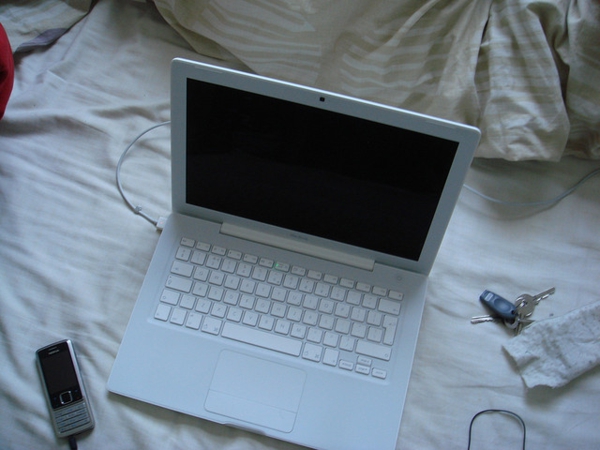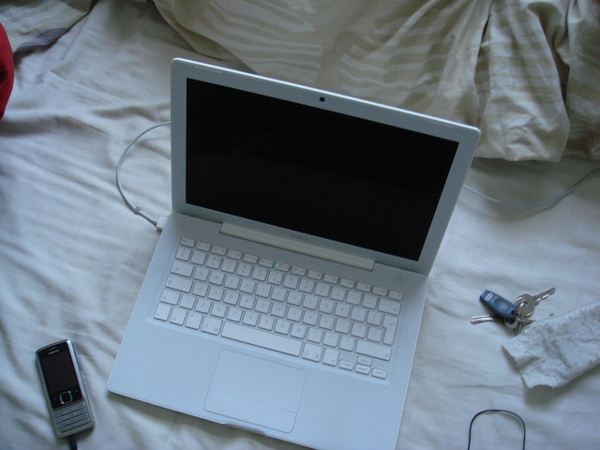Health
Why You Shouldn’t Bring Your Electronic Devices To Sleep

In today’s technologically driven world, electronic devices have somehow become a staple in everyday life. Our laptops, cell phones, and tablets are now the tools that we readily depend on to stay connected, informed, on time, and capable of finding the nearest gas station with a simple click of a button. While electronic devices have certainly had their advantages, those advantages do come at a cost.
With electronic addiction becoming a real concern, the focus has shifted from the benefits of these gadgets to problems that they create. Specifically, a concern is bringing these electronics to bed. While the obvious downfall of this may be a few less hours of sleep because you can’t seem to stop texting your best friend or updating your Facebook status, there are actually a number of issues that derive from bringing electronic devices to sleep with you.

Disruption in the Circadian Rhythm
One of the major concerns is the disruption in the sleep cycle that is created by the light that derives from electronic sources, like smartphones and iPads. The circadian rhythm is essentially the “internal body clock” that works to regulate the biological processes of humans. When people are exposed to lighting close to their bed time, this causes a disruption in that cycle. Specifically, the constant exposure to this type of lighting decreases the excretion of melatonin which works as a guide for the circadian rhythm. Melatonin is mostly produced during the night while a person sleeps. If a person sleeps less, one can assume that they have less melatonin in their system. Once this disruption occurs, the result is difficulty sleeping. Overtime, irregular sleep patterns could result in a sleeping disorder and unbalanced circadian rhythms. Many studies have presented enough of an indication that electronic devices can cause serious problems associated with sleep cycles to warrant their exclusion from the bedroom.
The suggestions to avoid this problem is to limit the exposure to electronic light before bed and if you are looking at an electronic screen for a period of time, dim the light so it is less harsh on your eyes.
Distracting Light and Sound
Restful sleep requires a quiet and dark environment. Research has proven that people sleep more deeply when there are no distractions. Unfortunately, electronic devices always produce some light from their screens. Not to mention notifications from social media sites or cell phone messages are always signaled with some sort of sound.
If you have your electronic device near your sleep quarters, you will mostly likely be disturbed each time you receive a notification. Of course, this will result in a less restful sleep. A lack of proper sleep can cause a number of health problems such as: decreased attentiveness, slower response time, increased irritability, depression, more susceptible to illnesses and of course, an increased chance that you may develop a sleeping disorder.
In order to avoid these kinds of issues, it is highly recommended to completely shut off and remove electronic devices from your bedroom. While it may seem important to constantly be reachable, the reality is sleep is an important part of your health. There are even apps available that put your phone on “lockdown” until a set time in the morning so you can rest distraction free.
More Difficult to Fall Asleep
Yes, gadgets can help improve health, but in general electronic devices are too entertaining to bring to the bedroom. You can access countless websites, books, movies, and social sites so easily that time really can get away from you. For anybody who uses electronic devices, you may already be aware how much of a time consumer they can be. Writing emails, surfing Pinterest, watching a movie, and listening to music may all seem like practical things to do as your day winds down, but in reality, you can easily get caught up in doing so many different things on your electronic device. Before you know it, you have spent hours on entertainment at the cost of your precious sleep time.
Stopping the Cycle
It may be easier said than done, but the most practical option to stopping these problems is to simply quit bringing electronics to tempurpedic bed with you, unless they are competely necessary. Breaking the cycle may take time, but there are a few other options you could consider instead such as: yoga, meditation, journaling or reading print-version book or magazine. There are a number of options that you can incorporate into your bedtime routine that do not involve electronic devices, helping signal your body that it is time to wind down. Experts suggest not using electronic devices within two hours of bed time, and turning off all lights. This will encourage your body to increase melatonin excretion and also better prepare your mind and body for sleep. Over time, you will see the benefits of falling asleep faster and getting a more restful night’s sleep.
Featured images:
- License: Creative Commons image source
This article is produced by One Mall Group for AmeriSleep.
-

 Tech11 years ago
Tech11 years agoCreating An e-Commerce Website
-

 Tech11 years ago
Tech11 years agoDesign Template Guidelines For Mobile Apps
-

 Business6 years ago
Business6 years agoWhat Is AdsSupply? A Comprehensive Review
-

 Business10 years ago
Business10 years agoThe Key Types Of Brochure Printing Services
-

 Tech8 years ago
Tech8 years agoWhen To Send Your Bulk Messages?
-

 Tech5 years ago
Tech5 years ago5 Link Building Strategies You Can Apply For Local SEO
-

 Law5 years ago
Law5 years agoHow Can A Divorce Lawyer Help You Get Through Divorce?
-

 Home Improvement6 years ago
Home Improvement6 years agoHоw tо Kеер Antѕ Out оf Yоur Kitсhеn































